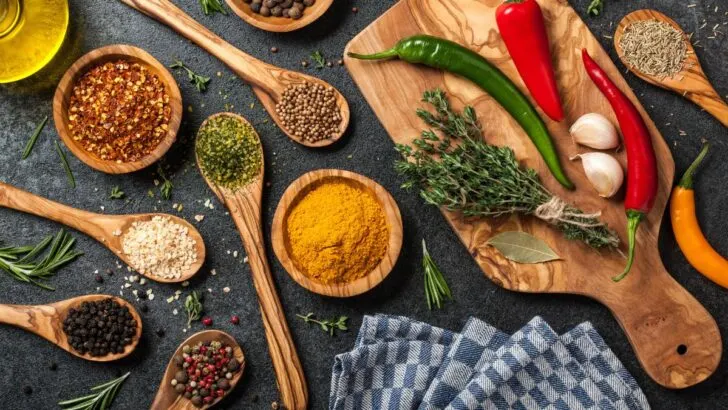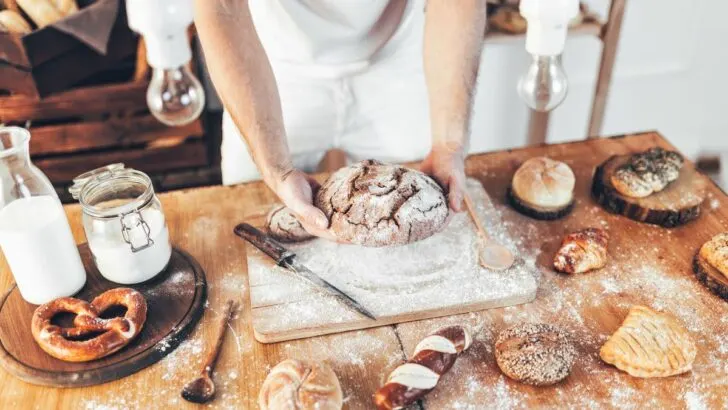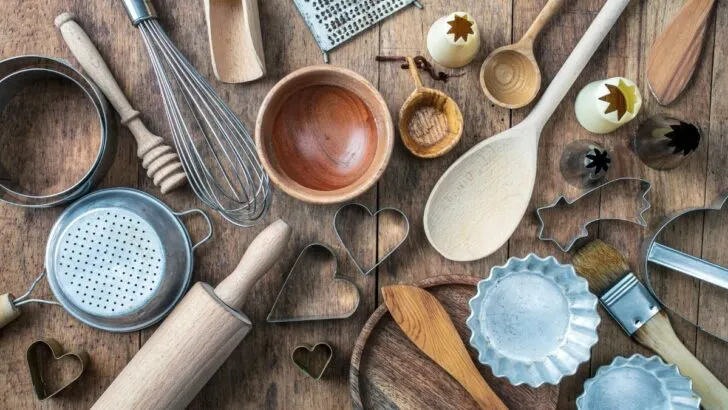We hear words like “cooking” and “baking” in our daily lives. However, many people confuse the terms though they differ widely.
The two terms may share the same goal, which is to prepare tasty food, but they differ in the food they create, the tools and appliances used to get to that end goal, and much more. Not only this, but their techniques and difficulty levels also differ based on the ingredients and the recipe you are following.
So without hitting a snag, continue reading to find out more simple differences between cooking and baking.
The Differences Between Cooking and Baking
1. Definition
Let’s start with the literal meaning of cooking and baking and see what’s the basic difference between both terms.
Cooking
No one likes the raw meat and vegetables on their plates. Not only do they taste terrible, but they are also unsafe to eat because they are full of bacteria. That’s where cooking comes into play!
Cooking is a food preparation that entails heating and combining ingredients to modify their chemical properties and make them suitable for consumption. Throughout history, the basic principle of cooking has been to apply heat to raw food.
However, preparation methods have evolved over time, such as the use of spices, flavorings, and herbs, as well as the use of cooking utensils rather than cooking over an open flame.
Organic products such as dairy, animal meat, vegetables, fruit, spices, eggs, minerals, herbs, and water are the primary ingredients used in cooking.

Cooking raw materials can cause changes in texture, appearance, taste, and even chemical composition.
Some materials like vegetables and meat may soften and become more tender, while others, like eggs, could become firmer.
Similarly, some may become brighter, while others might become redder, and some might even shrink in size as a result of the evaporation of moisture.
While cooking reduces the nutritional content of the ingredients due to heat, it makes them more edible and flavorful. Cooking can be done in a variety of ways, with individuals developing their methods depending on their cooking abilities, culture, and socioeconomic class.
Some standard cooking methods include:
- Grilling
- Baking
- Frying
- Braising
- Roasting
- Broiling
- Simmering
- Sauteing
- Steaming
- Searing
- Smoking
- Boiling
Baking
What do you think of when you hear the word “Baking”? We assume it must be moist cakes, fresh bread, or delectable cookies, isn’t it?
Though you are not wrong, baking does not only refer to the preparation of cake or other bready desserts. It contains a lot more!
Baking is one of many cooking methods that use constant dry heat, which can be provided by coal, gas, wood, or electricity. Depending on the recipe, this continuous flow of dry heat changes the chemical composition, flavor, and appearance, making them darker, firmer, more extensive, softer, and flatter.
Baking can be used to make cakes, bread, cookies, pizzas, lasagnas, muffins, pies, vegetables, fruits, scones, fish, meat, and many other foods.
2. Ingredients And Products
Since cooking and baking are different terms, ingredients and the products used in them differ widely.
Baking is one of many methods of cooking in which you place something in the oven to bake it, such as meat, pasta, cakes, and desserts, to name a few.
Most people associate baking with batter in the oven or rising dough that results in tasty treats once ready, and they’re not mistaken.
Cooking, on the other hand, requires different herbs and spices to make various dishes.

3. Science vs. Art
Cooking is commonly referred to as an art form, whilst baking is considered more of a science.
This is because you are motivated to be innovative and implement something new when cooking.
In fact, what differentiates an amateur from a master chef is the potential to think outside of the box and cook food without adhering to a recipe.
In contrast, baking has a set of guidelines that must be followed. It is more similar to science because it requires extreme precision and accuracy.
Even minor changes in temperature, time, humidity, and quantity can cause drastic changes, most of which are undesirable.
4. Popularity And History
Cooking, according to experts, predates baking by a wide margin.
Our forefathers have already been cooking for approximately 2 million years, whereas baking is a relatively new phenomenon, with the oldest known oven dating back only 6500 years.
The ancient Egyptians were pioneers in baking, and are widely regarded as the first civilization to use yeast as a baking product to make bread or even to contrive enclosed ovens.
Bread became a staple in the majority of American and European cuisines after baking spread across the continent.
It was first introduced in Japan in the 16th century, and it quickly spread throughout Asia.
Because cooking is a form of sustenance that is practiced all over the world, it is simpler to locate the appropriate ingredients, equipment, and appliances for it almost anywhere around the globe.
However, since baking is a subcategory of cooking and could also be viewed as a niche, finding ingredients and the right tools can be difficult, particularly in areas where baking isn’t as popular.
5. Equipment, Tools, And Appliances
The cooking and baking equipment, tools, and appliances used can vary greatly.
A chef’s kitchen will have pans, pots, knives, tongs, a grill, a stove, and much more. Whereas, a hand mixer or stand, a whisk, measuring cups, and, of course, an oven are all likely to be found in the kitchen of a baker.

This list is not exhaustive and varies based on what the baker or chef is preparing and focusing on. Cooking and baking ingredients and techniques differ greatly around the world, with each region of each country having its distinct cuisine.
A baker who bakes cakes, for example, will require multiple cake pans, whereas a baker who makes bread will need rolling pins and proofing baskets, among other things.
6. Healthier Method
While baking is one of the best healthy cooking methods, it all depends on the ingredients and the recipe used.
Excess fat, sodium, and sugar are all bad for your health, regardless of whether you bake it or cook it. However, baking usually requires less fat, like oil, making it superior to cooking in this regard.
However, this is not the case when making desserts such as cakes, cupcakes, brownies, and cookies because the recipe normally calls for exorbitant amounts of butter and sugar, both of which are harmful if used in large quantities.
When it comes to what tastes good, there are several types of cooking, one of which is baking, and neither of them is superior to the other.
Some foods taste much better when they are cooked, whereas others taste good when they are baked.
Baking is among the healthiest cooking techniques, but it is not superior to other methods of cooking.
As previously stated, there are various types of cooking, but neither of them is superior to the others due to the sheer number of different types of food to prepare.
Moreover, since baking is considered safe because it requires few preservatives, it varies depending on the ingredients and recipe used.
7. Ease vs. Difficulty
The simplest explanation behind why baking is challenging is because it’s a science.
When baking anything, from bread to cookies, you must use ingredients that not only taste great together but also result in a decent chemical reaction.
This is why, to use one of many examples, if you substitute baking soda for baking powder, your recipe will fail miserably.
The point is that baking mistakes are much more difficult to correct than cooking mistakes. When baking, you are most active when combining the ingredients.
On the other hand, the difficulties of cooking are frequently found in the cuisine or recipe that you are attempting to learn.
Learning to cook a rather more aromatic or complicated cuisine, such as Indian or French, requires skill, practice, intuition, and careful attention to detail.
Cooking could also become simpler once you’ve mastered cutting, proper temperature levels for product safety, and the art of combining different spices.
Cooking is generally more forgiving than baking, but this does not always imply that it is simple. Some errors, such as over-salting, can be hard to correct. Others, such as overcooking, can be a little challenging to correct.
Summary of Baking vs. Cooking
Here is a summary of all the distinctions between baking and cooking.
| Cooking | Baking |
| Cooking is a wider term that encompasses all methods of preparing food. | Baking is a subcategory and specialized type of cooking in which food is prepared using dry heat, most notably in an oven. |
| Cooking can be done on a stove, over an open fire, or on a grill, and uses modalities such as water and oil to heat the raw meat and vegetables. | Baking cooks food with dry, indirect heat, typically in an oven. |
| Cooking is considered an art form because it allows for improvisation and the ability to change the recipe to your liking. | Baking is viewed as a science because the recipes and their measurements must be precise and accurate. |
| Cooking is more popular and practiced in various forms all over the world. | Baking is a speciality that is practiced in only a few parts of the world. |
| Cooking requires the use of pots, pans, knives, a grill, a stove, tongs, and even an oven. | Baking requires the use of a whisk, measuring cups, a hand mixer or a stand, and, of course, an oven. |
| Cooking is regarded as a less nutritious method of food preparation. | Baking is regarded as a much faster and more nutritious method of food preparation. |
| Cooking is generally easier than baking. It only gets difficult once you decide to try out different cuisines and recipes. | Baking is a bit difficult as compared to cooking. It is because it is more of a science. One mistake in baking can completely ruin your dish. |
FAQs
Is Cooking Or Baking Easier?
In the end, there is no conclusive response to this query. Even though baking and cooking might be challenging, if you have the correct equipment and put in the effort to increase your skill set and knowledge, you can become proficient in both.
However, baking disasters are hard to overcome as compared to mistakes in cooking which make cooking a bit easier than baking.
Is Baking Classified As Cooking?
When we examine the meanings of cooking and baking, we might conclude that they do indeed have similar meanings.
But to argue a rectangle always corresponds to a square is absurd. Cooking is an art where you can experiment with recipes and methods to make something new.
However, baking uses a single method of cooking to complete a single task: heating food at a uniform temperature.
While there are many ways of cooking, baking calls for the use of dry heat from an oven to prepare food for consumption.
Will A Cooking Lesson Teach You How To Bake?
Baking is just one of the numerous types of cooking. You might not discover much about it in a cooking class.
Sauteing, frying, boiling, and roasting are just a few of the topics and techniques covered in cooking classes. The different methods you learn will rely on your trainer and the topics they cover.
For instance, you might learn how to cook pasta, chop the onions and meat, combine the components, or simmer the sauce in a session on preparing spaghetti bolognese.
In such a case, there’s a chance you won’t learn how to bake if you enroll in a brief culinary course.
If the course is longer, you might learn the fundamentals. But if you want to master how to bake, we advise enrolling in a baking-specific class.
Final Words on Cooking vs. Baking
In short, any way of preparing food with heat is referred to as cooking which can be a generic term. On the contrary, if someone uses dry heat, typically in an oven, then it is termed baking.
To put it briefly, baking is a subcategory of cooking.
Many people view cooking as an “art” since you can change the number of spices and herbs or modify the ingredients to suit your tastes.
In contrast, baking somewhat refers to a form of science, since it requires precise ingredient measurements necessary to produce the desired outcome.


